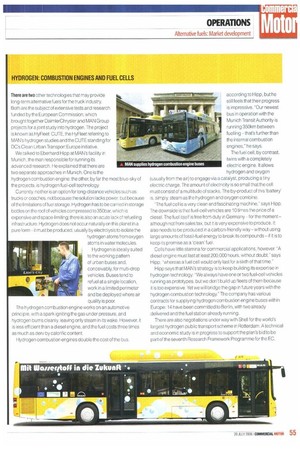HYDROGEN: COMBUSTION ENGINES AND FUEL CELLS There are two other
Page 55

If you've noticed an error in this article please click here to report it so we can fix it.
technologies that may provide long-term alternative fuels for the truck industry. Both are the subject of extensive tests and research funded by the European Commission, which brought together DaimlerChrysler and MAN Group projects for a joint study into hydrogen. The project is known as HyFleet: CUTE, the HyFleet referring to MAN's hydrogen studies and the CUTE standing for DC's Clean Urban Transport Europe initiative.
We talked to Eberhard Hipp at MAN's facility in Munich, the man responsible for running its advanced research. He explained that there are two separate approaches in Munich. One is the hydrogen combustion engine; the other, by far the most blue-sky of the projects, is hydrogen fuel-cell technology.
Currently, neither is an option for long-distance vehicles such as trucks or coaches, not because the solution lacks power, but because of the limitations of fuel storage. Hydrogen has to be carried in storage bottles on the roof of vehicles compressed to 350bar, which is expensive and space-limiting; there is also an acute lack of refuelling infrastructure, Hydrogen does not occur naturally on this planet in a pure form it must be produced, usually by electrolysis to isolate the hydrogen atoms from oxygen atoms in water molecules.
Hydrogen is ideally suited to the working pattern of urban buses and, conceivably, for multi-drop vehicles. Buses tend to refuel at a single location, work in a limited perimeter and be deployed where air quality is poor.
The hydrogen combustion engine works on an automotive principle, with a spark igniting the gas under pressure, and hydrogen burns cleanly, leaving only steam in its wake. However, it is less efficient than a diesel engine, and the fuel costs three times as much as dery by calorific content.
Hydrogen combustion engines double the cost of the bus, according to Hipp, but he still feels that their progress is impressive. "Our newest bus in operation with the Munich Transit Authority is running 350km between fuelling -that's further than the internal combustion engines," he says.
r •
MAN supplies hydrogen combustion engine buses
The fuel cell, by contrast, twins with a completely electric engine. It allows hydrogen and oxygen (usually from the air) to engage via a catalyst, producing a tiny electric charge. The amount of electricity is so small that the cell must consist of a multitude of stacks. The by-product of this 'battery' is, simply, steam as the hydrogen and oxygen combine.
"The fuel cell is a very clean and fascinating machine," says Hipp. The downside is that fuel-cell vehicles are 10 times the price of a diesel. The fuel itself is free from duty in Germany for the momentalthough not from sales tax, but it is very expensive to produce. It also needs to be produced in a carbon-friendly waywithout using large amounts of fossil-fuel energy to break its compounds if it is to keep its promise as a 'clean' fuel.
Cells have little stamina for commercial applications, however. "A diesel engine must last at least 200,000 hours, without doubt," says Hipp, 'whereas a fuel cell would only last for a sixth of that time."
Hipp says that MAN's strategy is to keep building its expertise in hydrogen technology: "We always have one or two fuel-cell vehicles running as prototypes, but we don't build up fleets of them because it is too expensive. Yet we will bridge the gap in future years with the hydrogen combustion technology." The company has various contracts for supplying hydrogen combustion engine buses within Europe: 14 have been committed to Berlin, with two already delivered and the fuel station already running.
There are also negotiations under way with Shell for the world's largest hydrogen public transport scheme in Rotterdam. A technical and economic study is in progress to support the plan's bid to be pail of the seventh Research Framework Programme for the EC.
























































































































































































